Rolf Weih (1906–1969) was a German film actor, who played supporting parts in many comedies and musicals of the 1930s and 1940s. After the war he appeared in numerous Heimat-films in West-Germany.
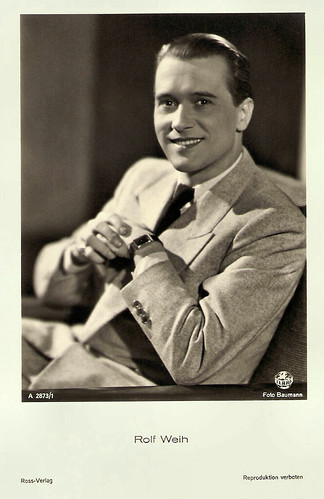
German postcard by Ross Verlag, no. A 2873/1, 1939-1940. Photo: Baumann / Terra.
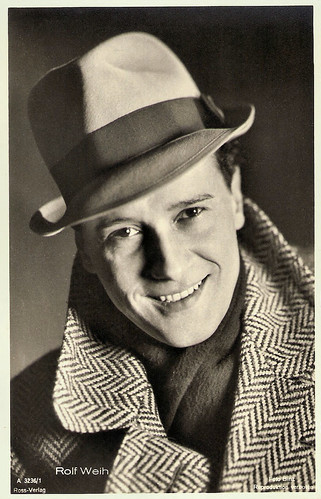
German postcard by Ross Verlag, no. A 3236/1, 1941-1944. Photo: Tita Binz.
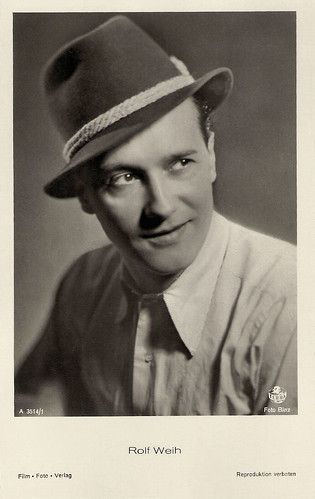
German postcard by Film-Foto-Verlag, no A 3514/1, 1941-1944. Photo: Tita Binz / Terra.
Rolf Weih was born in 1906 in Barmen near Wuppertal, Germany. He was the son of a medical board.
After his graduation from high school, Weih did a commercial apprenticeship. He then worked in various industries, including as an engineer at Siemens & Halske in Berlin.
Weih also appeared as an amateur magician at the vaudeville circuit and performed as a cabaret artist. He did performances in Hamburg and Paris. In 1927 he got an engagement at the Rose-Theater in Berlin for three years.
In 1930, he played his first small film role in Flachsmann als Erzieher/Flachsmann as an educator (Carl Heinz Wolff, 1930) with Paul Henckels and Charlotte Ander.
Weih took acting lessons and performed as an operetta buffo in various provincial theatres. In 1936, the Ufa brought him for the film camera for the film Männer vor der Ehe/Men before marriage (Carl Boese, 1936). From then on, Weih worked mainly as a film actor.
He had a supporting part in the Propaganda film Kameraden auf See/Comrades at Sea (Heinz Paul, 1938), starring Theodor Loos. The film is set during the Spanish Civil War, which it portrays as a Communist uprising against the lawful government.
Weih appeared often as the young lover with a comedic note, for example, in Der Gouverneur/The Governor (Viktor Tourjansky, 1939) as the partner of Hannelore Schroth. In Lauter Liebe/Nothing but Love (Heinz Rühmann, 1940), he had one of his few leading roles opposite Hertha Feiler and also did a singing number.
He also appeared in the Revue film Wir machen Musik/We Make Music (Helmut Käutner, 1942), starring Ilse Werner and Viktor de Kowa, and the comedy Meine Frau Teresa/My Wife Theresa (Arthur Maria Rabenalt, 1942) starring Elfie Mayerhofer and Hans Söhnker.
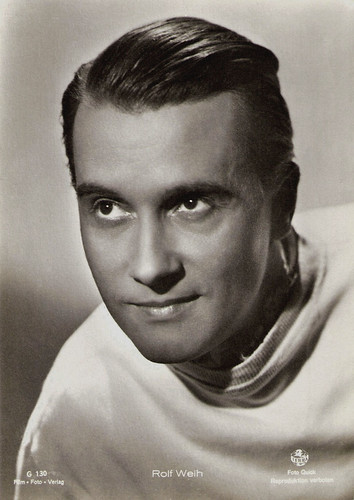
German postcard by Film-Foto-Verlag, no. G 130, 1941-1944. Photo: Terra / Quick.
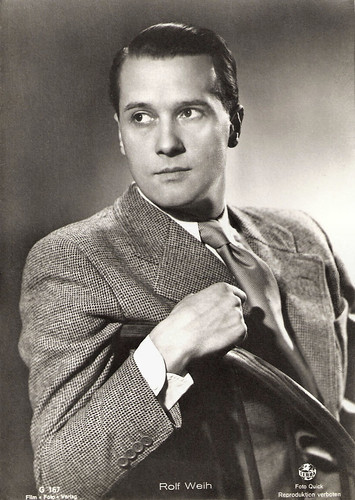
German postcard by Film-Foto-Verlag, no. G 167, 1941-1944. Photo: Terra / Quick.
After the war, Rolf Weih was seen in the West-German crime comedy Freitag, der 13/Friday the Thirteenth (Erich Engels, 19489), starring Fritz Kampers, Angelika Hauff and Fita Benkhoff.
It was already made in 1944 by Tobis, but the film was not released before the end of the Second World War. Several Nazi-era productions were given releases in the years after the end of the war.
Weih also had a supporting part in the crime film Mordprozeß Dr. Jordan/The Murder Trial of Doctor Jordan (Erich Engels, 1949), starring Rudolf Fernau and Maria Holst.
During the 1950s, he became a busy supporting actor and participated in numerous Heimat-films. Examples are Grün ist die Heide/The Heath Is Green (Hans Deppe, 1951) with Sonja Ziemann and Rudolf Prack, and Durch die Wälder, durch die Auen/Through the Forests and Through the Trees (Georg Wilhelm Pabst, 1956) with Eva Bartok.
In East-Germany he appeared in the musical Rauschende Melodien/Swelling Melodies (E.W. Fiedler, 1955), based on the operetta Die Fledermaus (The Bat) by Johann Strauss II and Richard Genée and produced by the state-backed DEFA studios.
Among his final films were Die 1000 Augen des Dr. Mabuse/Diabolical Dr. Mabuse (Fritz Lang, 1960) with Dawn Addams, and the Freddy Quinn musicals Freddy und die Melodie der Nacht/Freddy and the Melody of the Night (Wolfgang Schleif, 1960) and Freddy und das Lied der Südsee/Freddy and the Song of the South Seas (Werner Jacobs, 1962).
For health reasons, he had to restrict his professional activity from 1961 on. Rolf Weih was married to the dancer Ira Kraut and was the father of two children.
In 1969, Rolf Weih died after a heart attack in Frankfurt am Main and was buried in the Berlin cemetery Wilmersdorf. He was 63.
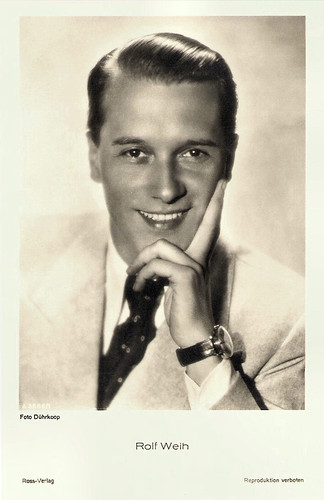
German postcard by Ross-Verlag, no. A 3586/1, 1941-1944. Photo: Dührkoop.
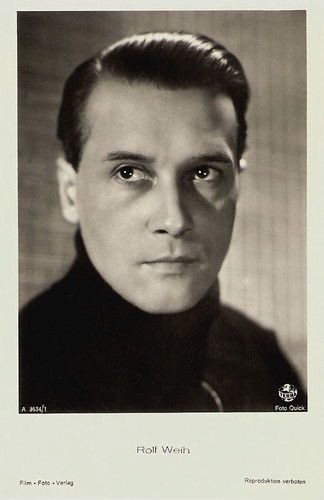
German postcard by Film-Foto-Verlag, no. A 3634/1, 1941-1944. Photo: Terra / Quick.
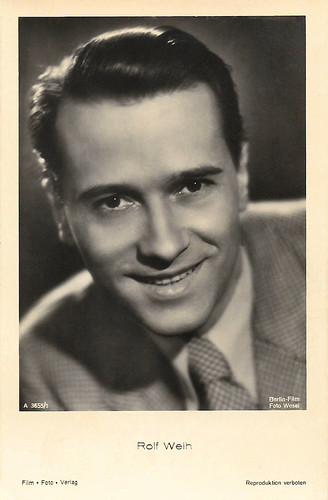
German postcard by Film-Foto-Verlag, no. A 3655/1, 1941-1944. Photo: Wesel / Berlin Film.
Sources: Stephanie D’heil (Steffi-Line – German), Wikipedia (English and German), and IMDb.

German postcard by Ross Verlag, no. A 2873/1, 1939-1940. Photo: Baumann / Terra.

German postcard by Ross Verlag, no. A 3236/1, 1941-1944. Photo: Tita Binz.

German postcard by Film-Foto-Verlag, no A 3514/1, 1941-1944. Photo: Tita Binz / Terra.
Young lover with a comedic note
Rolf Weih was born in 1906 in Barmen near Wuppertal, Germany. He was the son of a medical board.
After his graduation from high school, Weih did a commercial apprenticeship. He then worked in various industries, including as an engineer at Siemens & Halske in Berlin.
Weih also appeared as an amateur magician at the vaudeville circuit and performed as a cabaret artist. He did performances in Hamburg and Paris. In 1927 he got an engagement at the Rose-Theater in Berlin for three years.
In 1930, he played his first small film role in Flachsmann als Erzieher/Flachsmann as an educator (Carl Heinz Wolff, 1930) with Paul Henckels and Charlotte Ander.
Weih took acting lessons and performed as an operetta buffo in various provincial theatres. In 1936, the Ufa brought him for the film camera for the film Männer vor der Ehe/Men before marriage (Carl Boese, 1936). From then on, Weih worked mainly as a film actor.
He had a supporting part in the Propaganda film Kameraden auf See/Comrades at Sea (Heinz Paul, 1938), starring Theodor Loos. The film is set during the Spanish Civil War, which it portrays as a Communist uprising against the lawful government.
Weih appeared often as the young lover with a comedic note, for example, in Der Gouverneur/The Governor (Viktor Tourjansky, 1939) as the partner of Hannelore Schroth. In Lauter Liebe/Nothing but Love (Heinz Rühmann, 1940), he had one of his few leading roles opposite Hertha Feiler and also did a singing number.
He also appeared in the Revue film Wir machen Musik/We Make Music (Helmut Käutner, 1942), starring Ilse Werner and Viktor de Kowa, and the comedy Meine Frau Teresa/My Wife Theresa (Arthur Maria Rabenalt, 1942) starring Elfie Mayerhofer and Hans Söhnker.

German postcard by Film-Foto-Verlag, no. G 130, 1941-1944. Photo: Terra / Quick.

German postcard by Film-Foto-Verlag, no. G 167, 1941-1944. Photo: Terra / Quick.
Diabolical Dr. Mabuse
After the war, Rolf Weih was seen in the West-German crime comedy Freitag, der 13/Friday the Thirteenth (Erich Engels, 19489), starring Fritz Kampers, Angelika Hauff and Fita Benkhoff.
It was already made in 1944 by Tobis, but the film was not released before the end of the Second World War. Several Nazi-era productions were given releases in the years after the end of the war.
Weih also had a supporting part in the crime film Mordprozeß Dr. Jordan/The Murder Trial of Doctor Jordan (Erich Engels, 1949), starring Rudolf Fernau and Maria Holst.
During the 1950s, he became a busy supporting actor and participated in numerous Heimat-films. Examples are Grün ist die Heide/The Heath Is Green (Hans Deppe, 1951) with Sonja Ziemann and Rudolf Prack, and Durch die Wälder, durch die Auen/Through the Forests and Through the Trees (Georg Wilhelm Pabst, 1956) with Eva Bartok.
In East-Germany he appeared in the musical Rauschende Melodien/Swelling Melodies (E.W. Fiedler, 1955), based on the operetta Die Fledermaus (The Bat) by Johann Strauss II and Richard Genée and produced by the state-backed DEFA studios.
Among his final films were Die 1000 Augen des Dr. Mabuse/Diabolical Dr. Mabuse (Fritz Lang, 1960) with Dawn Addams, and the Freddy Quinn musicals Freddy und die Melodie der Nacht/Freddy and the Melody of the Night (Wolfgang Schleif, 1960) and Freddy und das Lied der Südsee/Freddy and the Song of the South Seas (Werner Jacobs, 1962).
For health reasons, he had to restrict his professional activity from 1961 on. Rolf Weih was married to the dancer Ira Kraut and was the father of two children.
In 1969, Rolf Weih died after a heart attack in Frankfurt am Main and was buried in the Berlin cemetery Wilmersdorf. He was 63.

German postcard by Ross-Verlag, no. A 3586/1, 1941-1944. Photo: Dührkoop.

German postcard by Film-Foto-Verlag, no. A 3634/1, 1941-1944. Photo: Terra / Quick.

German postcard by Film-Foto-Verlag, no. A 3655/1, 1941-1944. Photo: Wesel / Berlin Film.
Sources: Stephanie D’heil (Steffi-Line – German), Wikipedia (English and German), and IMDb.
No comments:
Post a Comment